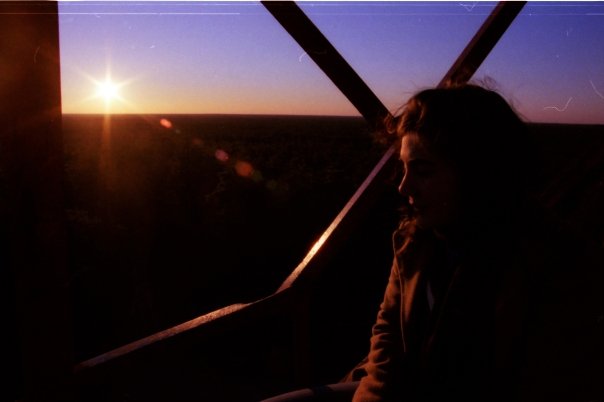First of all, I can never make up my mind. I don't know what I want to "do with my life." I don't know where I should focus my talent, what I should practice more than another. I consider myself a musician, songwriter, photographer, filmmaker. I dreamed of a multimodal project before I knew there was a word for it. In high school, I began recording voicemails to use as sound collages for songs I was writing. I envisioned a tightly-woven concept album, complete with my own photography, scans of hall passes and notes from girls, screen names scrawled on diner napkins. Of course, in the midst of recording this project, the borrowed computer I was using started having problems. I poured a lot of work into the project, but it was never finished. Also, I was tired of being stopped by the cops for photographing public spaces. I gave up on multimodality. I retreated.
A lot of places were really important to me during this time. I used to have to escape a lot. First, it was to my headphones, absorbing a cannon of rock, roll, and confessional poetry. I taught myself guitar. Then, there was the diner. We would escape in numbers, misfits and outcasts, to where we thought it was okay to only order a cup of coffee and stay for three hours. When I needed to be alone, I could drive to Apple Pie Hill, the highest point in South Jersey. From the top of the fire tower, on a clear day, skylines of both Philly and Atlantic City are visible. When it looked certain that my parents were divorcing, it got ugly. Escape became essential. I bonded with others (kids, really) who couldn't go home. The ultimate escape was moving to Minnesota, alone. The ultimate defeat was moving back.
One common thread through all of this is my car. I've had the same car for more than seven years and 100,000 miles. I feel at home in my car, and (though somewhat morally opposed to the environmental and social havoc it may cause) I feel weird (for lack of a better word) when I haven't driven in a while. I can click on the radio, practice my singing, and if I'm lucky enough to have a passenger, engage in some philosophical conversation.
Then there is "The Space Between Mom and Dad." It has been tricky to navigate. After two years of not speaking to my dad, I reconnected, served as his best man in his wedding, and produced for him a campaign video when he ran for town council. Forgiveness, however, is a complicated process. I remember he canceled my phone number in my first semester away at a college, well into the post-pay-phone era.
And finally, speaking of phones, is this week's development. My girlfriend, who is living in Tennessee, told me that she needs a break from talking on the phone. We can't seem to communicate long distance. My earliest memory is when my parents left to go on a date, and I became hysterical. I remember locking myself away from my well-intensioned grandmother and crying myself to sleep. I have this other memory of being told never to call. Maybe I was just destined to be insecurely attached. Anyway.
There are so many places, physical, mental, spiritual. What do I do?
A lot of places were really important to me during this time. I used to have to escape a lot. First, it was to my headphones, absorbing a cannon of rock, roll, and confessional poetry. I taught myself guitar. Then, there was the diner. We would escape in numbers, misfits and outcasts, to where we thought it was okay to only order a cup of coffee and stay for three hours. When I needed to be alone, I could drive to Apple Pie Hill, the highest point in South Jersey. From the top of the fire tower, on a clear day, skylines of both Philly and Atlantic City are visible. When it looked certain that my parents were divorcing, it got ugly. Escape became essential. I bonded with others (kids, really) who couldn't go home. The ultimate escape was moving to Minnesota, alone. The ultimate defeat was moving back.
One common thread through all of this is my car. I've had the same car for more than seven years and 100,000 miles. I feel at home in my car, and (though somewhat morally opposed to the environmental and social havoc it may cause) I feel weird (for lack of a better word) when I haven't driven in a while. I can click on the radio, practice my singing, and if I'm lucky enough to have a passenger, engage in some philosophical conversation.
Then there is "The Space Between Mom and Dad." It has been tricky to navigate. After two years of not speaking to my dad, I reconnected, served as his best man in his wedding, and produced for him a campaign video when he ran for town council. Forgiveness, however, is a complicated process. I remember he canceled my phone number in my first semester away at a college, well into the post-pay-phone era.
And finally, speaking of phones, is this week's development. My girlfriend, who is living in Tennessee, told me that she needs a break from talking on the phone. We can't seem to communicate long distance. My earliest memory is when my parents left to go on a date, and I became hysterical. I remember locking myself away from my well-intensioned grandmother and crying myself to sleep. I have this other memory of being told never to call. Maybe I was just destined to be insecurely attached. Anyway.
There are so many places, physical, mental, spiritual. What do I do?


 RSS Feed
RSS Feed